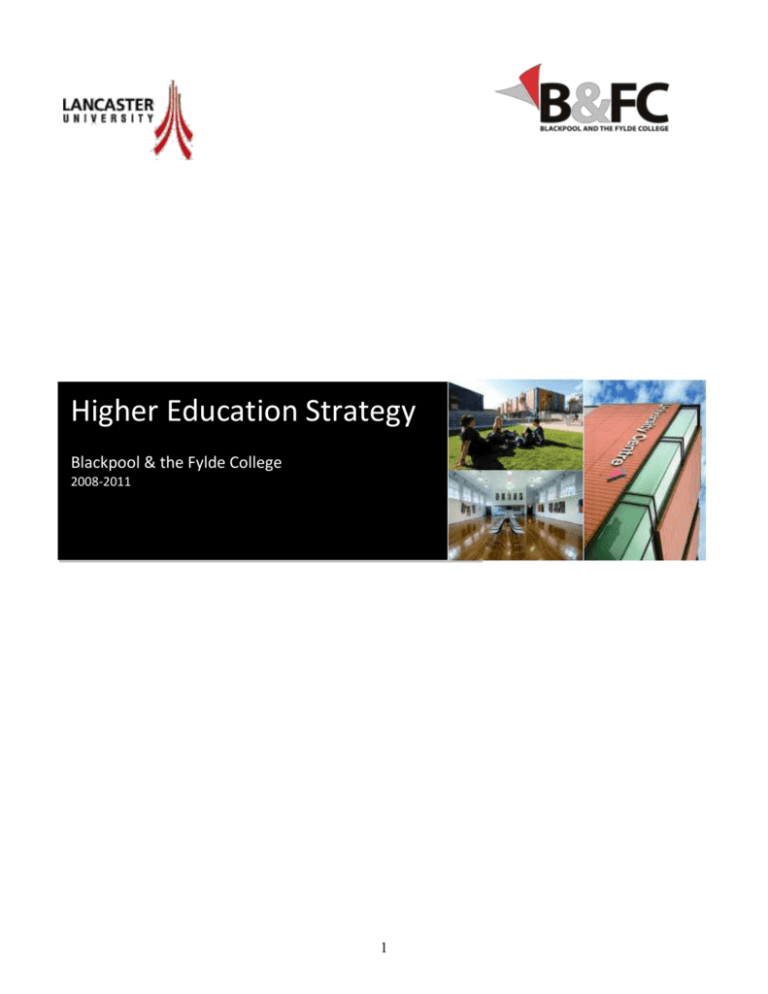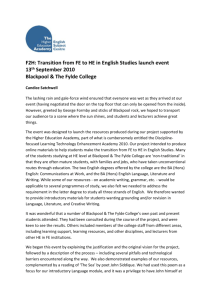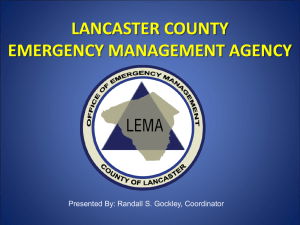blackpool & the fylde college - Blackpool and The Fylde College
advertisement

Higher Education Strategy Blackpool & the Fylde College 2008-2011 1 BLACKPOOL AND THE FYLDE COLLEGE HIGHER EDUCATION STRATEGY INTRODUCTION The HE Strategy of the College is a considered response to several key drivers and is informed by the strategic objectives of key partners including Lancaster University; the Higher Education Funding Council for England (HEFCE); North West Development Agency (NWDA); and the Learning and Skills Council (LSC). The Strategy is also informed by publications including the Leitch Review; the LSC (2006) National Employer Skill Survey; LSC North West Skills priorities 2007 – 2010; the Higher Education Funding Council for England Strategic Plan 2006-11 (updated April 2007); the Higher Education Funding Council for England HE in FE Consultation and Outcomes (2007) and the DIUS/DCSF review 'World Class Apprenticeships: Unlocking Talent, Building Skills for All' (2008). Blackpool and the Fylde College is currently the 5th largest Further Education provider of higher education in England, receiving direct funding from the Higher Education Funding Council of England (HEFCE) to support around 1570 full time equivalent (FTE) students. In 2007/08 nearly 1400 full time students and over 500 part time students enrolled at the College on a wide range of courses, including Higher National, Foundation Degree and Honours Degree programmes. Particular academic strengths include a suite of degrees in creative subjects – Photography, Graphic Design, and Illustration – which enjoy a national reputation for excellence; a strong portfolio of Engineering programmes with particular specialism in Automotive Engineering; and a growing selection of Humanities Degrees in, for example, English Language & Literature, Criminology and History & Heritage. The College firmly locates Higher Education at the core of its mission: “Leadership in Learning, Excellence at Work”. It is inextricably linked and continuous with its other provision, namely vocational Further Education; employer engagement; Train to Gain; and 6th Form Studies. Consequently the College brands its provision as university level; vocational; and relevant to all people in our local communities. Higher Education is central to the College’s ambition to act as a catalyst for change in our local communities through enabling economic regeneration and social inclusion. The overall theme of the College’s HE provision is vocational relevance; courses are designed to provide students with knowledge and skills directly applicable to particular professional occupations, and many have been developed in close consultation with employers and industry representatives. Foundation Degree programmes are rapidly growing and are proving highly successful in supporting professional workforce development. The development of higher education at the College has its origins in a longstanding partnership with the University of Lancaster, and the great majority of programmes are validated by Lancaster, with only a small number validated by other universities, including the University of Central Lancashire, Liverpool John Moores and the University of Huddersfield. The college, in partnership with Lancaster University, and supported by a KPMG demand assessment study, has identified that there is considerable unmet demand for higher education in and around Blackpool, and a growing need for higher level skills to support economic 2 development. As a result of a successful bid for HEFCE Strategic Development Funds (SDF) and NWDA funding, work is now beginning to develop the Central Blackpool campus as a predominantly higher education centre which will make a significant contribution to the regeneration of Blackpool and the surrounding area. The capital project will be completed in September 2009. Widening participation in higher education is a primary objective for a College located in one of the most deprived parts of England. Providing a skilled work-force with higher level skills is critical to economic stability for the communities we serve and essential to ensure that we are able to provide local industries with the supervisory, technical, managerial and professional level staff they require to develop, maintain and grow their businesses within the reality of the global business community. The College endeavours, though all of its activities, to achieve learner centred practices that are sensitive to diversity and inclusion. KEY PRINCIPLES UNDERPINNING THE HIGHER EDUCATION STRATEGY Two underlying principles will shape our strategy for the development of higher education at the College: 1. Ensuring we identify and maximise the benefits of delivering higher education from within a further education college. 2. At the same time, developing ways of managing higher education which recognise the distinctiveness of the staffing, teaching and resourcing strategies needed to achieve success. These two principles are not important for arbitrary reasons; they are the practical expression of our recognition of the particular needs of higher education students; they therefore link directly to the College’s values, in particular our commitment to “placing the learner at the heart of all we do”. In relation to the first principle, the key benefits that stand out are in our view threefold. Firstly, the presence of a large cohort of FE students provides us with plentiful opportunities to increase our recruitment to HE programmes through the systematic encouragement of progression from Level 3 to Level 4. Secondly, the strong tradition of student support within FE colleges at HE level can increasingly be offered to students from non-traditional backgrounds, thus contributing to widening participation and student success. Thirdly, our strong track record of employer engagement both in the design and delivery of our FE provision, can be extended into the development of our HE provision in exciting and innovative ways. In relation to the second principle, we have begun work, using funding provided by HEFCE's Teaching Quality Enhancement Fund (TQEF) to thoroughly explore the way in which our pedagogy can be developed to embrace elements of scholarly activity. Work is underway in parallel to review the extent to which our model for deploying teaching staff and educational resources to support our HE provision can be better attuned to the particular challenges facing lecturers who are delivering a highly vocational HE curriculum. Specifically we will be investigating ways in which time can be provided for staff at different levels to pursue a range of applied research activities. ACADEMIC DEVELOPMENT 3 The College has over 75 Higher Education programmes in validation; has its own HEFCE funded student numbers; validation agreements with 5 Universities for Foundation Degrees, Honours and Ordinary Degrees; and one Masters Degree and 2 other post graduate awards. The Universities are: Lancaster University, University of Central Lancashire; Liverpool John Moores University; and the University of Huddersfield. The College Higher National Provision is awarded by Edexcel. The College participated in the Integrated Quality Enhancement Review Pilot (IQER) in 2007. One clear outcome of participating in the pilot was a better understanding of the benefits and the risks associated with multiple partnerships. Following from IQER, the College has decided to withdraw from the relationship with the University of Huddersfield and will develop new curriculum in the area of Business and Management that will be validated by Lancaster University. Following a review of academic strategy as part of the recent development with Lancaster University of a successful bid for HEFCE Strategic Development Funds, we have identified the following priorities: To develop a high-profile HE Centre of Excellence in Gaming and Casino–related studies, building on the ERDF funding already secured to launch Blackpool & the Fylde College’s Regional Gaming Academy in 2006. To greatly expand vocational Engineering provision, through the further development and expansion of Nautical Engineering, Automotive and Aeronautical Engineering, Coin Slot Technology and Gaming Technology Foundation Degrees, as progression routes to University degrees. To build on the national reputation for excellence in contemporary Art & Design enjoyed by both the University and College through the introduction of new courses and services geared specifically to the regional strategy for the development of Creative Industries. To greatly expand the range of Foundation Degree programmes tailored to the needs of local employers, especially in areas linked to the College’s strong Level 3 curriculum areas, such as Sport and Leisure, Travel and Tourism, Hair & Beauty, Health, Care and Early Years. To expand the range of part time professional programmes available locally, to meet the growing local and regional need for qualified managers, accountants, HR professionals, marketing and legal specialists. This would include not only current courses – such as CIPD, CIMA and EDMS – but the development of new ideas, such as Foundation Degrees and the Professional Apprenticeship model. To develop Year Zero provision to support student progression to degree programmes and to widen participation. This academic development strategy is closely aligned to the local agenda for economic development in Blackpool and the Fylde coast and to the North West Regional Economic Strategy's priorities in respect of creative industries, digital media, maritime and automotive industries. It also builds on the college's existing strengths in further education provision, 4 including our three Centres of Vocational Excellence (COVEs), which have been awarded in Customer Service Quality for Resort Tourism, Building Services and Automotive Manufacturing Engineering. Our key strategic goals for academic development are: With support funding from the North West Development Agency and the HEFCE SDF bid, to concentrate the majority of our HE provision on the newly refurbished Central Blackpool site, starting from September 2007. This will enable us to create a modern learning environment especially suited to the needs of HE and professional adult students. Our plans – outlined in greater detail in the business case presented to HEFCE in support of our SDF bid – include refurbishment of existing teaching facilities, the creation of a new Learning Hub at the centre of the campus which will accommodate new library and ICT facilities, student welfare and guidance services, conference and video-conference facilities, meeting rooms and social and refreshment facilities. The new campus should be fully in operation by September 2009. To grow our HEFCE funded provision over a ten year period to at least 2500 FTEs. To review and where necessary extend our provision at Level 3 and Level 4 to maximise progression from College FE to HE provision. While the current proportion of our own students moving on to HE programmes is a highly creditable 33%, this figure ranges considerably from one area to another. There is scope to increase internal progression in a number of key areas and we will set targets for each College School. To consolidate and extend our key academic partnership with the University of Lancaster, which will continue to be our preferred partner for all future developments. This will involve the further development of progression routes to the University for appropriate students. To continue to develop flexible, modularised provision, including short-cycle programmes designed to support lifelong learning and higher level workforce skills development. To continue to develop strong employer engagement in HE course design and delivery following our recent successes with major blue chip companies as well as local SMEs. To continue the move towards an academic structure where each subject or occupational area combines a Foundation Degree route with the option of a top-up year to progress to a full Honours Degree. Only where there are exceptional circumstances will we in future develop any further Higher National or full Honours Degree programmes. To continue to explore opportunities for any further development of Masters programmes. However, these will only be considered in exceptional circumstances and only when delivered in conjunction with the University of Lancaster, who would normally be expected to be the lead partner in this type of provision. We recognise that our success in academic development must be underpinned by a continued commitment to maintaining rigorous and thorough academic quality assurance systems. As 5 part of the IQER process we have produced a College HE Self Evaluation Document, which will be updated annually and will establish further goals to ensure continuous improvement across our HE provision. The provision contained in the FE and Training Act 2007 that selected FE Colleges should have the power to validate their own Foundation Degrees is a welcome recognition of the growing contribution to higher education being made by FECs. This College will wish to take advantage of this new power, although the implications for our longstanding and valued partnership arrangements with Lancaster University will need to be carefully considered and discussed before taking any action. TEACHING, LEARNING AND SCHOLARLY ACTIVITY The College has developed a distinctive strategy for teaching and learning at higher education level, which is set out in greater detail in the separate strategy document“, A Strategy for HE Curriculum: Teaching, Learning and Assessment”. The key aim is to enable learners to become self directed, autonomous and reflective in their learning. The design of our undergraduate education will take full account of the need for students to take responsibility for their own learning needs, and take the lead in their own personal development. This will increasingly be articulated through the development of more flexible, modular HE programmes with multiple entry and exit points. The College is committed to supporting scholarly activity which is appropriately tailored to the nature of HE provision within a further education setting. Our approach will be that scholarship and research will be a clearly identified activity, with measurable targets and outputs which will be agreed annually with academic managers. Staff will be expected to demonstrate that their activities impact directly on the students, on the quality of the provision and on the level of engagement with their subjects and their industry sectors which would be expected of tutors in an HE School with a vocational emphasis. Scholarly and developmental activities will include: Developing employer engagement including consultancy Organising symposia and conferences at the college Practice-based research (developing a body of work in their own field) Writing papers Development of pedagogy Ensuring HE teaching is at the forefront of current subject practice The College will maintain its support for staff with a substantial HE teaching commitment to achieve appropriate postgraduate qualifications. In addition to remission from teaching duties which may be granted in support of scholarly activity, lecturers will continue to be entitled to time off for study. Scholarship funding is necessary to maintain the skills; knowledge and understanding of the dynamics in their fields of study; and the professional interests of our teaching staff. Throughout the period of this plan, the College will use the funds available to embed a scholarship culture and promote the dissemination of scholarly activity. Debate and discussions with staff from the HE Academy have been very useful in enabling staff to recognise skills needs. We participated in a skills writing workshop which was well received and has acted as a stimulus for further activity. Continuing professional development of all staff lies at the heart of much of the success of the College. There are very few College lecturers 6 who do not teach across the spectrum of our provision. In the longer term we anticipate further involvement and perhaps membership of the HE Academy. The development of the HE campus at Central Blackpool is a catalyst for a renewed focus on learning resources for higher education. The Deputy Head of Learning Resources and the Learning Resource Centre Manager at the University Centre will have a specific remit to develop our HE library facilities and extend our specialist HE library stock. Current inter-library loan arrangements, including our agreement with the University of Lancaster will be reviewed and enhanced where necessary. In addition the LRC team will provide leadership and coordination for the further development of virtual learning environments and the creation of a “digital learning community” which will enable continued innovation in the delivery of teaching and learning. The College recognises the importance of distributed learning and the strategic role of JISC in supporting such developments to enhance the learners’ experience. The College hosted the JISC Regional Support Centre prior to its transfer to Lancaster University. The Head of Computer Network Services has served as deputy chair of two JISC committees: the Integrated Information Environment Committee and the Distributed e-Learning Committee. It is anticipated that our continued commitment to widening participation will bring with it an increase in the need to develop specialist additional learning support for higher education students. This will include enhanced study support, extension of tutorial activities, further development of personal development portfolios and enhanced access to specialist support for students with physical disabilities, hearing and visual impairment, dyslexia, mental health problems and other learning support needs. Consideration will be given early in the life of this plan to the introduction of specialist learning mentors for HE students. Careers education, information and guidance forms a critical part of the College’s strategy as a provider of learner focussed FE and HE. This strategy addresses economic development and social inclusion by preparing learners for a successful transition to employment or further study and for effective management of their career thereafter. In addition to the Careers education, information and guidance delivered through Student Services, careers education and personal development are key features of all HE programmes. Students are advised of the service at induction and directed to the Student Handbook which provides information on the services available to students while registered at the College and those that will continue to be available to them when they have left. The College practises an ethical service that is impartial, client-focused, confidential, collaborative, accessible and in accordance with the institution's Equality Charter. It identifies and provides for the individual needs of students who are likely to be disadvantaged in the labour market. A diagnostic service is available early in the programme of study to identify learning needs. This is recognised as critical to learner achievement. Students may self refer or be referred by academic tutors. PARTNERSHIP AND THE EXTERNAL ENVIRONMENT Our HE strategy is based on a thorough analysis of our external environment, including a thorough and rigorous demand assessment which was carried out by KPMG in the summer of 2004. Our analysis has established the extent to which our HE provision is currently meeting local, regional and national demand, and the potential for further growth in each of these market 7 segments. The College has engaged with Foundation Degree Forward to ensure exposure of the curriculum to wider markets. Within the area of the Fylde coast, which the College serves, there are significant pockets of economic deprivation, particularly around the Blackpool area, where much of the College’s current HE provision is located. The Fylde coast is geographically distinct, and travel to existing regional HEIs to access opportunities represents a real disincentive to participation in HE for many local residents, especially those on low incomes or with family commitments. The parliamentary constituencies of Blackpool North and Fleetwood and Blackpool South have HE participation rates of less than 21% and less than 27% respectively. Hence, the expansion of HE at Blackpool will significantly contribute to widening participation locally, will be directly supportive of the economic regeneration of the local area, and will offer local residents, businesses and employers enhanced access to HE research, teaching and consultancy services. There is also a significant regional dimension to our provision, delivered primarily through an extensive and well-developed network of employer links. In many areas HE development has been the result of active dialogue between employers across the North West of England and in some cases beyond. An outstanding example of this is the UK’s first Foundation Degree in Project Control, designed and developed in conjunction with BAe Systems Ltd, with integrated progression to a BSc and eventually to Masters level at Lancaster University. Another example is the involvement of Lancashire and Merseyside automotive manufacturers in designing and building an engine testing facility which will not only support the development of two Automotive Engineering Foundation Degrees, but will be used by the industry to develop new engine technology. A key element of our strategy for growth will be through this type of engagement with local and regional employers. Finally, we have developed a number of specialist programmes which serve a national niche market and draw students from around the UK. These include a number of Art & Design Honours Degrees and our Foundation Degree in Nautical Science. By their very nature as niche subjects the growth potential in many of these areas is relatively limited, but our strategy envisages steady expansion of this high quality provision through the careful development of new programmes in areas closely linked to existing specialisms. In summary, our analysis shows: About 40% of our current HE student recruitment derives from the national market for highly specialised, niche courses. We anticipate that this group will continue to grow slowly, with a higher number of students applying from the local and regional population. It will decline as a proportion of our overall HE provision to about 30% by 2014/15. About 30% of our current recruitment comes through our employer engagement activity, attracting ambitious working professionals, often supported by their employers, who are seeking career progression through achieving HE qualifications. Many of these students will have entered employment through vocational, rather than academic qualifications and therefore form a significant element of our widening participation strategy. We forecast that this group will grow steadily, rising to about 40% of our overall provision by 2014/15. About 30% of our current students are mature adult returners, typically adults seeking a career change or pursuing higher education for the first time in order to enhance their 8 personal and career development options. In many cases they have previously been FE students at the College. They are often very local students from non-traditional backgrounds and represent a key element in our widening participation strategy. We anticipate that this group will grow slightly, but will remain about 30% of our overall HE provision by 2014/15. We envisage the expansion of HE at Blackpool and the Fylde College as a significant contribution to widening participation in the North West region. By virtue of the relative geographical isolation of the Fylde coast, there are significantly fewer academic institutions active in higher education in this area than in comparable areas. Successful development of a major campus based in Blackpool would provide a West Lancashire focus for a coherent regional HE development strategy based on the existing network of HE and FE partner institutions. The College has committed to joining in the bid for funding for the Lancashire Lifelong Learning Network as an integral strand of our strategy to promote vocational higher education; to effectively engage with key employment sectors and to strengthen progression opportunities. MANAGEMENT AND GOVERNANCE Higher Education provision is mature and well-developed at Blackpool and the Fylde College. With the support of the University of Lancaster the College has been able to develop a robust academic management framework and rigorous quality assurance systems. As an Associate College of Lancaster University, the College is a member of the University’s Committee for Associated Colleges (CAC), and the University chairs an Annual Assessment Board for all programmes it validates. One of the key reasons for our strong academic partnership with the University of Lancaster is to ensure that we benefit from their long experience in maintaining the highest standards of academic excellence. The Quinquennial Review, conducted by the Lancaster University Office for Associated Institutions is a periodic institutional evaluation of the College in order to determine whether it provides an appropriate institutional environment for higher education work in those areas where courses are validated by the University. It also formally reviews, on behalf of the Senate, the Associate College status which the University conferred on the College in 1993. The latest review, undertaken in 2008, has provided an opportunity to evaluate the effectiveness of our partnership arrangements with Lancaster and to put in place arrangements to ensure continued effectiveness over the next five years as the partnership evolves. There is a well developed cross-college HE management structure within the College. The Director of Higher Education is a member of the college Strategic Management Team and of the Academic Management Team. There are two key HE Committees, the HE Strategy Group chaired by the Principal, and an HE Academic Development Committee, which focuses on academic standards, curriculum development and quality enhancement. Two out of the twelve members of the College Governing Body have considerable experience of Higher Education, and one of them, who is currently University Secretary and Head of the Academic Division of Lancaster University, is also a member of the Quality and Standards Subcommittee of the Board. The Board receives regular reports on strategic HE issues. The College has a well developed approach to risk assessment and management. Key components of this approach, which is set out in detail in the Risk Management Policy, include 9 a Risk Management Group comprising members of the College Senior Management Team, an Annual Risk Management Plan which is reviewed twice a year and an annual report to the College Audit Committee on the effectiveness of the plan. In addition, key strategic risks are selected each year for intensive review by the College’s internal auditors and the results reported to the College Board. We recognise the management challenge inherent in our HE Strategy. As we move forward with our strategy for growing both the volume and scale of our HE provision, we will need to continuously review the impact our growth is having on our HE academic and administrative infrastructure. This will need to take account of the recommendations arising from the IQER pilot with which we have been involved. Our HE Strategy is shared with the University of Lancaster and other key partners, who are asked to contribute any views or comments as part of a consultative process. The formal process of approval for the Strategy is via HE Strategy Group, the Senior Management Team and then to the College Governors. The HE Strategy is a public document, available to staff and students of the College, and will be placed on the College intranet. 10







